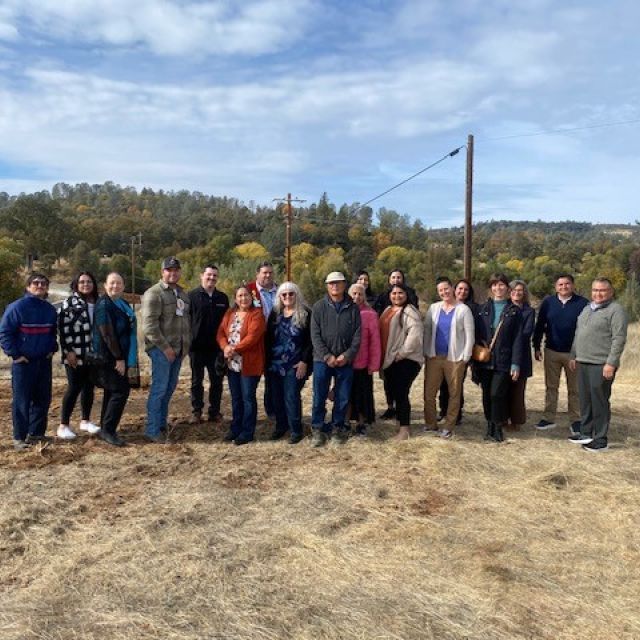This piece is part of our series, Policy Actions for Racial Equity (PARE), which explores the many ways housing policies contribute to racial disparities in our country.
The Low-Income Housing Tax Credit, otherwise known as the Housing Credit, is the nation’s number one tool for financing the production and preservation of affordable rental homes. So how can we expand access to this crucial tool for Black, Indigenous, and People of Color (BIPOC) and other historically marginalized housing providers?
That was a focus of a policy session recently when Enterprise hosted participants from our Equitable Path Forward (EPF) initiative, a five-year, $3.5 billion nationwide initiative to help dismantle the legacy of racism in housing by providing capital investment and advisory services to BIPOC and other historically marginalized housing providers to generate wealth in their communities.
As a leader in the Housing Credit community, Enterprise is working at the federal, state, and local levels to address barriers to participation, which include requirements that can amplify decades of systemic racism in housing and real estate development.
How States Allocate the Housing Credit
In October 2023, the National Council of State Housing Agencies (NCSHA) published the 7th Edition of its Recommended Practices in Housing Credit Administration. As the national trade group representing all state housing finance agencies (HFAs), NCSHA’s Recommended Practices are considered the gold standard for guidance on administering the Housing Credit. The recent update of the recommendations incorporates several changes proposed by Enterprise, including language that could create new and improved opportunities to close the racial developer gap and encourage investment in communities of color.
While the implementation of NCSHA’s Recommended Practices is not required by law, states often incorporate them, at least to some degree, in their Qualified Allocation Plans (QAPs), which are mandatory documents that states publish regularly to outline the state’s requirements for the Housing Credit program. At present, many QAPs require developers applying for the Housing Credit to have previous successful experience developing or managing Housing Credit properties. While each state’s policies may differ slightly, the ostensible purpose of these policies is quality assurance at the earliest stages of the entire process. Successfully developing, owning, or managing a Housing Credit property does require significant expertise, and the Housing Credit is unique among multifamily residential development options.
Barriers to Entry for BIPOC Developers are Too High
Quality assurance requirements are an important public policy goal, as the Housing Credit is a limited public resource, and they have helped ensure the program’s incredible success. However, these requirements have had the unintended consequence of creating a small universe of qualified applicants across the country, because they have created unreasonably high barriers to participation in this program. When decades of systemic racism get factored in, the majority of Housing Credit developers or operators with successful experience are helmed mostly by white people, according to Affordable Housing Finance.
BIPOC-owned companies have long faced impediments at every turn. In addition to the nation’s long history of discriminatory housing policies that prevented households of color from purchasing homes, many BIPOC developers lack access to the wealth of friends and family members, extensive networks, and well-resourced communities to help them succeed in the real-estate business. These factors contribute to the disparities in the development industry and prevent many BIPOC individuals from even entering the development world. The number of BIPOC-led or -owned property developers is miniscule compared to the number of white-led or -owned ones, according to The New York Times, which reported that less than 1 percent of American real estate development companies are BIPOC-owned. NCSHA is aware of this and solicited feedback on their Recommended Practices particularly to address this problem.
Opportunities to Expand Access for Emerging Developers
In Enterprise’s comments to NCSHA, we proposed that HFAs should take a more nuanced approach to evaluating the experience of developers applying for the Housing Credit to reduce the high barriers to entry for BIPOC developers. HFAs should consider any type of experience with multifamily residential development, not just with the Housing Credit program, that an applying firm or its key staff may have (including prior experience with a different Housing Credit developer or at an HFA), when evaluating Housing Credit applications.
HFAs should also explore alternative ways to both increase and evaluate the capacity of developers beyond encouraging or requiring them to partner with more experienced developers who take a cut of the developer fee. Enterprise is pleased that NCSHA incorporated these suggestions in their Recommended Practices.
While the Housing Credit is unique among multifamily residential development options, companies that have developed multifamily residential property with other funding sources go through a similar development experience that require the developer to have complimentary expertise. The existing requirements that many HFAs have regarding prior experience with the Housing Credit create an artificially small group of qualified developers that self-perpetuates and rarely allows for the inclusion of newer or emerging developers with comparable qualifications.
During the EPF convening, cohort members from several states raised some of these exact concerns: that HFAs in their states have created, through their QAPs, unreasonable barriers to access and participation in the Housing Credit program. These policies can result in a bias against BIPOC developers who may have a strong record outside of the Housing Credit program. This conversation underscored the importance of the new language in NCSHA’s Recommended Practices that aims to lower these barriers without jeopardizing the program’s track record of success.
"The change we want to see is not going to come if we say we can do nothing about it. If we don't challenge systems, we will be in the same situation. We will cry in silence. We'll be robbed of our community equity. But more importantly, the reason why we develop is because we want to have a voice," Adenah Bayoh, Founder, Adenah Bayoh & Companies.
The Road Toward Greater BIPOC Developer Equity
NCSHA’s 7th Edition of its Recommended Practices in Housing Credit Administration is a good step forward. If states take heed, more BIPOC-led development firms will be able to compete and participate in the Housing Credit program. Enterprise is also working on solutions to help lower barriers to entry for BIPOC developers and complement NCSHA’s recommendations through the EPF program. EPF supports developers with entity-level lending and grants from the EPF Growth Fund, provides advisory services for BIPOC-led organizations, and offers curated training for future leaders in the industry. A recent report from The Grove details several additional solutions that could contribute to greater success for BIPOC developers in the real estate industry, including initiatives to increase diversity and inclusion in the industry, policy updates to ensure BIPOC developers are not being overlooked for loan opportunities, and additional research to gain a deeper understanding of the BIPOC developer experience. Enterprise is committed to exploring how we and our partners can continue to push the industry forward.
We encourage all who believe in creating a just society to read, discuss, and share the PARE blog series as we learn and act to address the impacts of housing policies on racial equity in America. We also invite you to join us in this conversation, by suggesting additional topics and sharing resources for how we can advocate for greater racial equity. If you’d like to offer feedback on our body of work, please reach out to the Public Policy team. You can also check out our blog and subscribe to our daily and bi-weekly policy newsletters for more information on Enterprise’s federal, state, and local policy advocacy and racial equity work.



